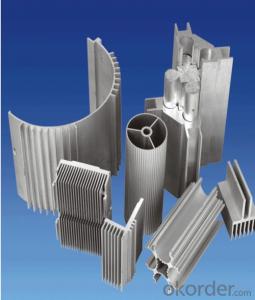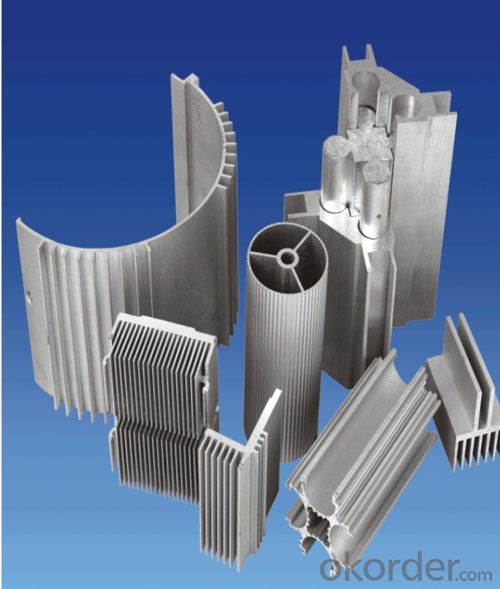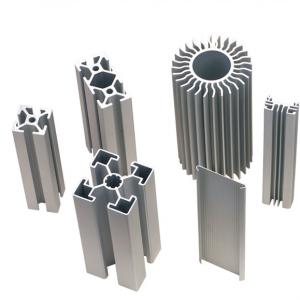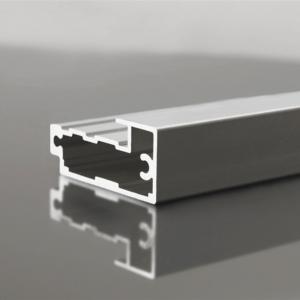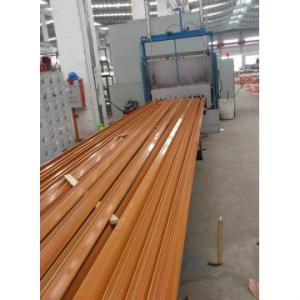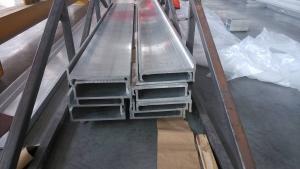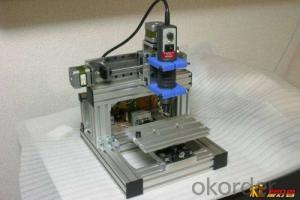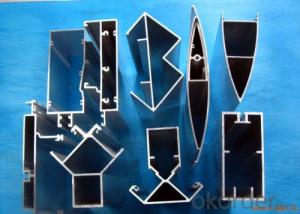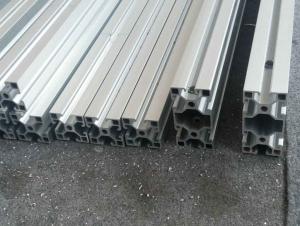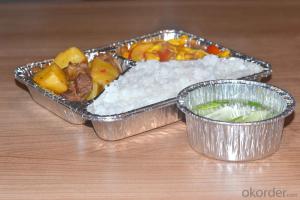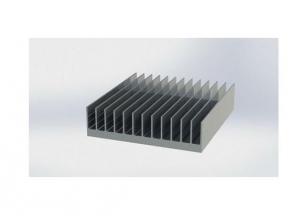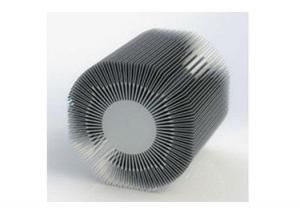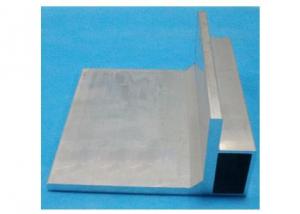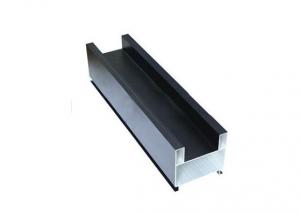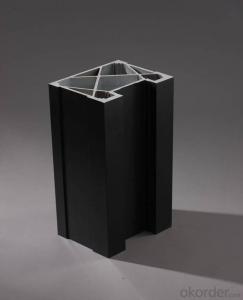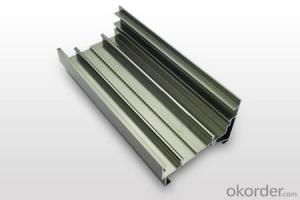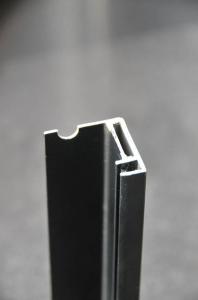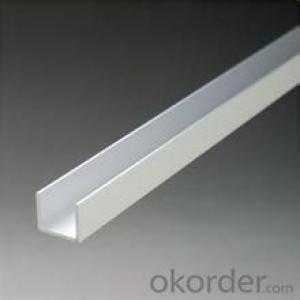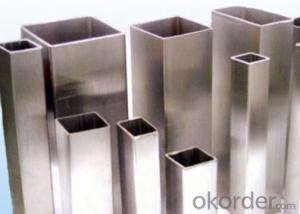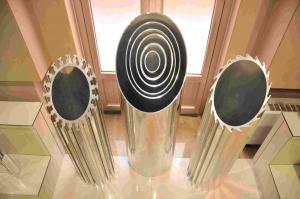Delemar Aluminium Profile Construction and Industry
- Loading Port:
- China Main Port
- Payment Terms:
- TT OR LC
- Min Order Qty:
- -
- Supply Capability:
- -
OKorder Service Pledge
OKorder Financial Service
You Might Also Like
Aluminium is a relatively soft, durable, lightweight, ductileand malleablemetalwith appearance ranging from silvery to dull gray, depending on the surfaceroughness. It is nonmagnetic and does not easily ignite. A fresh film ofaluminium serves as a good reflector (approximately 92%) of visible lightand an excellent reflector (as much as 98%) of medium and far infraredradiation. The yield strength of pure aluminium is 7–11 MPa,while aluminium alloys have yield strengths ranging from200 MPa to 600 MPa. Aluminium has about one-third the densityand stiffness of steel. It is easily machined,cast, drawn and extruded.
Features:
Material | Alloy 6063,6061,6005or according to customer’s choice |
Temper | T3, T4, T5, T6 |
Surface | Anodize, electrophoresis, powder coating, PVDF coating, wood grain painting, matted, etc. |
Length | Coating 6.5 meters, Anodizing 6.5 meters, Mill finish 5 meters |
Application | Industrial, electrical equipment(TV set, air conditioner, refrigerator, computer), decoration,construction, transportation |
Custom Made | We can package following with customer's request. |
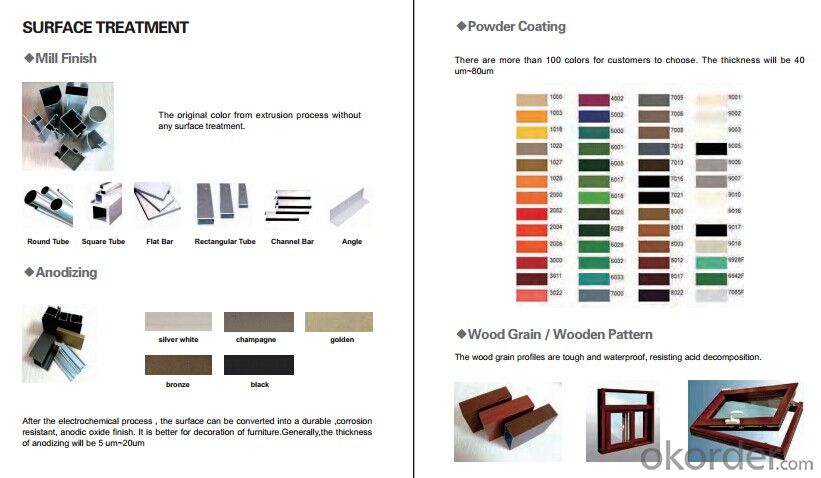
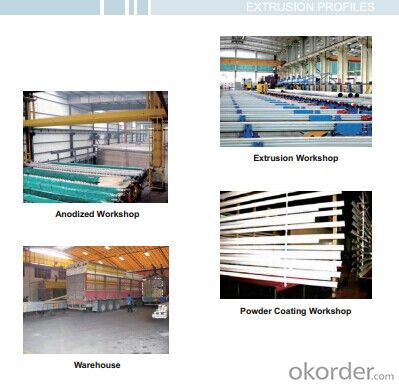
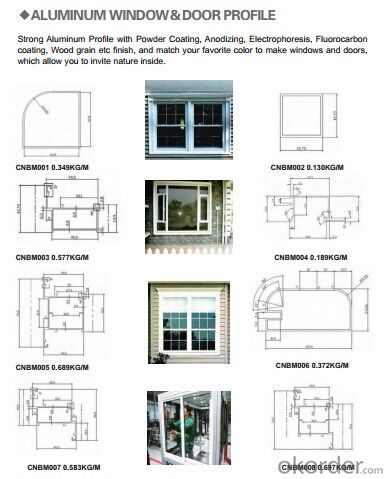
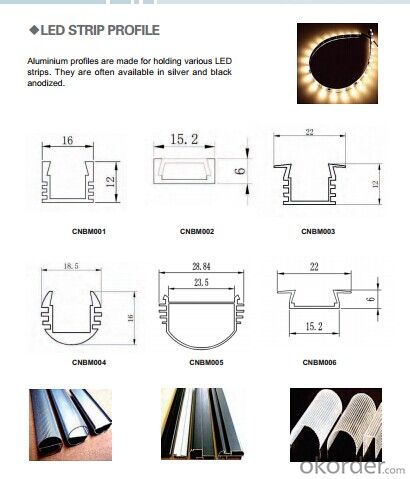
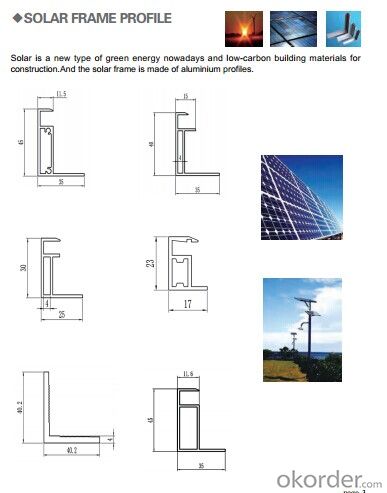
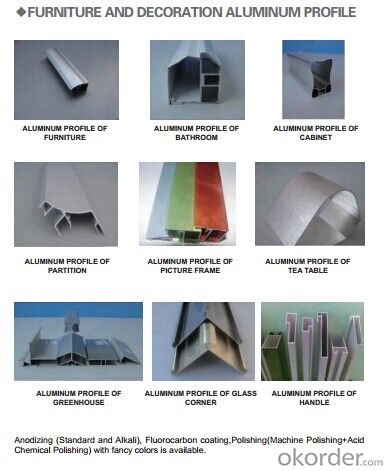
- Q: How do aluminum profiles perform in terms of energy efficiency?
- Aluminum profiles possess outstanding energy efficiency properties, making them widely utilized in numerous industries and applications, including construction, transportation, and manufacturing. Their ability to contribute to energy savings and sustainability is well-known. The lightweight nature of aluminum is one of the key reasons for its energy efficiency. In comparison to materials like steel, aluminum profiles are considerably lighter, resulting in reduced energy requirements for transportation and installation. This, in turn, decreases the overall carbon footprint associated with the manufacturing and use of aluminum profiles. Furthermore, aluminum exhibits high thermal conductivity, enabling efficient heat transfer. This characteristic proves particularly advantageous in windows and doors applications. By efficiently regulating the transfer of heat between a building's interior and exterior, aluminum profiles diminish the need for excessive heating or cooling, thereby leading to energy savings and reduced energy consumption. Moreover, aluminum profiles readily integrate with additional energy-efficient components, such as thermal breaks and insulating materials. These additions further enhance the energy performance of aluminum profiles by minimizing thermal bridging and enhancing insulation, thereby reducing energy loss. Additionally, aluminum is an extremely durable and long-lasting material. This durability translates to structures and products made with aluminum profiles requiring less maintenance and replacement over time. Consequently, this attribute contributes to overall energy efficiency by reducing the energy and resources needed for repairs and replacements. In conclusion, aluminum profiles are highly esteemed for their energy efficiency characteristics. Their lightweight nature, excellent thermal conductivity, compatibility with energy-efficient components, and long-term durability make them a sustainable choice that can foster energy savings and minimize environmental impact across various applications.
- Q: Are aluminum profiles suitable for roofing systems that need to withstand strong wind loads?
- <p>Yes, aluminum profiles can be used for roofing systems that require high levels of wind load resistance. Aluminum is a lightweight yet strong material with excellent resistance to corrosion and weathering. It can be engineered into profiles that provide the necessary structural integrity to withstand high wind loads. The flexibility of aluminum allows for the creation of various shapes and designs that can be tailored to meet specific wind resistance requirements. Additionally, aluminum's durability and low maintenance make it a popular choice for roofing systems in areas prone to high winds.</p>
- Q: Are aluminum profiles suitable for noise barriers?
- Yes, aluminum profiles are suitable for noise barriers. Aluminum is known for its durability, corrosion resistance, and lightweight properties, which make it an excellent material for noise barriers. Aluminum profiles can be designed to effectively reduce noise pollution by absorbing or reflecting sound waves. Additionally, aluminum's malleability allows for various design options, making it versatile for different noise barrier applications. It is also a sustainable material that is recyclable, making it an environmentally friendly choice. Overall, aluminum profiles are a suitable option for noise barriers due to their durability, effectiveness in reducing noise, and versatility in design.
- Q: Changhe brand aluminum can?
- Profile is not bad, but visibility is not too large, the whole is still very good, cost-effective
- Q: What are the different sealing options for aluminum profiles?
- There are several sealing options available for aluminum profiles, including anodizing, powder coating, liquid paint coating, and mechanical sealing. Anodizing is a popular choice, providing a durable and corrosion-resistant finish by creating a protective oxide layer on the surface of the aluminum. Powder coating involves applying a dry powder to the profile, which is then cured under heat to form a hard, smooth coating. Liquid paint coating can also be used, offering various colors and finishes, but may require more maintenance. Mechanical sealing involves using gaskets, tapes, or other sealing materials to create a tight seal between aluminum profiles. The choice of sealing option depends on the specific requirements of the application, such as desired aesthetics, durability, and environmental factors.
- Q: Can aluminum profiles be used in the production of food processing equipment?
- Yes, aluminum profiles can be used in the production of food processing equipment. Aluminum is a lightweight and versatile material that offers several advantages for this application. It is non-toxic and non-corrosive, making it suitable for use in food processing environments where hygiene is crucial. Aluminum profiles can be easily cleaned, have a high resistance to chemicals, and are not affected by moisture or humidity. Additionally, aluminum is a good conductor of heat, which is important for efficient food processing. It also has excellent structural strength and can be easily fabricated to create customized equipment. Overall, aluminum profiles are a popular choice in the food processing industry due to their durability, versatility, and hygienic properties.
- Q: Can aluminum profiles be used in structural applications?
- Yes, aluminum profiles can be used in structural applications. Aluminum is a lightweight and versatile material that offers excellent strength-to-weight ratio and corrosion resistance. It can be easily formed, welded, and machined, making it suitable for various structural projects such as building frames, bridges, and industrial structures.
- Q: I do aluminum sales, never been to Chongqing, want to sell the aluminum section of the building materials market to see, please say specific name and address, convenient for me to go, thank you!There must be aluminum material concentration distribution market, thank you!
- The city's building materials, base more than 70% of the sales in majiayan. But the furniture industry has become a major shortage of the traditional building materials market, which has become a major mishap of majiayan building materials market. Resulting in the entire building materials, home industry chain slightly inadequate.
- Q: This question is asking about the various types of railings and staircases that can be constructed using aluminum profiles.
- <p>Aluminum profiles are versatile and can be used to create a variety of railings and staircases. Common types include glass railings, cable railings, frameless railings, and traditional aluminum baluster railings. Each type offers different aesthetic and functional benefits. Glass railings provide a sleek, modern look with unobstructed views. Cable railings are minimalistic and allow for maximum visibility. Frameless railings are characterized by their open design and are often used in commercial settings. Traditional aluminum baluster railings are sturdy and can be customized with various styles and finishes. These aluminum railings and staircases are known for their durability, low maintenance, and resistance to corrosion.</p>
- Q: I would like to know where Urumqi has industrial aluminum profiles, such as 3030, 4040, 3060 aluminum, etc., note that industrial aluminum, not doors and windows, aluminum profiles, the difference between the two very large!
- And shares in the east railway station there, the east railway station and then go one Station Road (near the North Main Road) can see.
Send your message to us
Delemar Aluminium Profile Construction and Industry
- Loading Port:
- China Main Port
- Payment Terms:
- TT OR LC
- Min Order Qty:
- -
- Supply Capability:
- -
OKorder Service Pledge
OKorder Financial Service
Similar products
Hot products
Hot Searches
Related keywords
